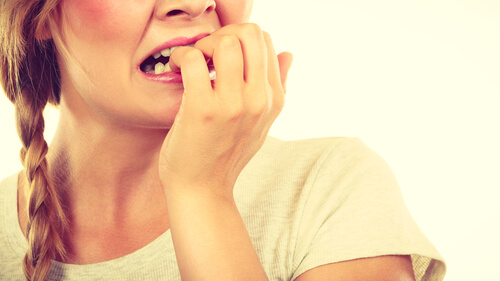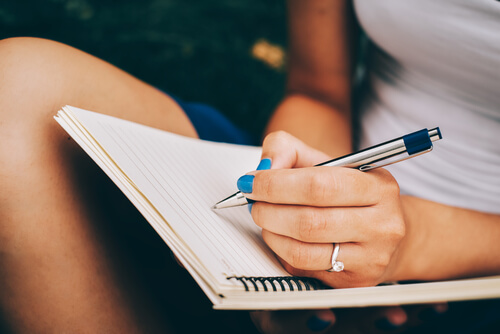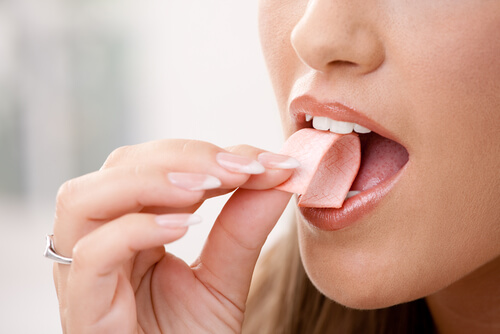7 Tips To Stop Biting Your Nails

An exam, a family reunion, an appointment, a long wait at the doctor’s. All these situations have something in common. In all of them we can suffer from anxiety, worry or shyness. These emotions or thoughts can be externalized with our words, our body or through gestures such as biting your nails.
Our hands have a very important role to play in communication. With them we can embrace, stroke and express ourselves. They can also transmit feelings such as restlessness, boredom, a desire to end a meeting, or even bad manners. Hands can express so much, and our fingernails can also be a reflection of our emotions or thoughts. Biting your nails, for many people, is a way of channeling sensations, albeit subconsciously. The name for this is Onychophagia. It is derived from two Greek words: onyx (nail) and phagein (to eat) (Cano, Peniche and Arellano, 2001).
Generally onychophagia is considered to be a compulsion. We do it to manage our feelings of restlessness, anxiety, and our intrusive thoughts. It has important consequences for our oral health, social image and, in the most serious cases, our self-esteem. Despite being a difficult habit to break, all is not lost. If it is not a serious case, it only takes a little bit of willpower, conscience and motivation.
Biting your nails – an unsolved problem
The truth is that biting your nails, or onychophagia, remains a mystery even for the worlds of psychology, medicine or psychiatry. In 2015, the Journal of Behavior Therapy and Experimental Psychiatry published an article that argued that onychophagia was not a sign of nerves or anxiety as most of us thought, but rather that it was a sign of perfectionism. By doing it, people can deal with their dissatisfaction or irritation.

There are also studies that show that a third of those suffering from onychophagia are in a family environment where another member of the family suffers from it. Here we can see cases of imitation by children in families where a father, mother or brother already does it. Other studies simplify the equation and relate onychophagia to pleasure. The action of biting the nails generates pleasant sensations.
So, it’s all about willpower then? Isn’t that just a cliche? They say that stopping doing something or carrying out an objective is just a matter of willpower. “If you don’t do it, it’s because you don’t really want to”, they say. The truth is that the cliche is loaded with as many pros as cons. It’s true that it gives us a simplistic view of reality, but it is no less true that will and motivation (whatever they may be) are the driving force and the strength. Without them we wouldn’t even be able to leave the starting block. But be careful, because wanting to do something is not the be all and end all.
“If you start by promising what you do not yet have, you will lose your will to achieve it.”
-Paulo Coelho-
The importance of willpower
Willpower doesn’t move mountains, but it is a very important starting point. It doesn’t matter if you fail, make mistakes or if you spend a whole summer without biting your nails and, on going back to work, you start doing it again. All endings are new beginnings. If one formula doesn’t work, try a different one. If you don’t want to change what you do, change how you do it.
What did you do wrong the last time? What mistake did you make? Remember how you felt when you got it right, and started again. Whenever you decide to start again, write a positive message to yourself, something that holds meaning for you, and put it somewhere visible. It will help you when temptations come. Just be aware at all times.
The most important first step towards correcting your mistakes is to first become aware of them. At work, in your relationships, in the way you communicate and in any activity you want to do better in. Fighting onychophagia is a long-distance race, not a sprint. A good way to start is through making notes, and recording the times when you bite your nails. Where were you? What were you doing?
Keeping a record
Recording things is a way of becoming aware of the activities you were doing or the people you were with when you started biting your nails. The time of day, the places, whether you were driving, waiting at traffic lights etc. Was it at the start or the end of the day? Each one of these moments is important because it will give you an idea of the stimuli associated with biting your nails.
“Realizing what needs to be done, and not doing it, is cowardly.”
-Confucious-

This prepares the brain and trains it to detect moments when you are at risk. First of all you need to record the times you started biting your nails. When you master that part, start to write down the times you bring your hands to your mouth (without actually biting). In the end, this exercise will help you realise when you start thinking about biting your nails. It’s a simple way of trying to stop these automatic reactions.
A small step
Small steps lead to great achievements. The great enemies of motivation are the impossible objectives. Maybe you have some special event or a job interview and you decide not to bite your nails. It is paradoxical because at the time of greatest anxiety you set aside your “weapon” in order to fight it.
At some point you are bound to end up forgetting the goal. You start biting your nails again and immediately you feel like a failure. Don’t put too much pressure on yourself to get rid of a habit such as onychophagia that may have been with you for years. There may be people who have been successful at the first time of asking. There are always people who talk about their last cigarette. But what about those who don’t function like that?
Trying not to be too hard on oneself is a good ally when temptation has beaten your willpower. Try just limiting to one or two fingers, or set yourself a weekend goal or a holiday period. The combination of simple and easier goals will make us achieve the bigger goals in the long run. Every step counts, and in the same way we need to record the behavior we want to change, it is also important to record our achievements.
“Our objectives are only achieved if you measure the progress”
-Guy Kawasaki-
Prepare for temptation
After getting to know the situations, people or times of the day when we start biting our nails, the next step is to avoid temptation. However we can’t escape from these situations or people all the time. One of the best strategies is to use the power of our mind to confront them. Simply anticipate the situation and visualize how you are going to get out of it without biting your nails. This can help to strengthen you at difficult times. Turn your mind to alternative thoughts, and think about positive messages that can support you.
Another remedy is to train your body to breathe and relax in order to combat situations that cause you anxiety.
“Whoever avoids temptation avoids sin”
-Ignacio de Loyola-
In the same way that we can train our body and mind, we can also learn to keep our behavior at bay, so to speak. One simple exercise consists of moving our hand towards our mouth. We then leave it 5 cm from the mouth, resisting the desire to bite our nails. We then hold it there for 20 seconds. If we do this to consciously train ourselves then we will gradually become used to it. It will then be easier to identify the sensations that precede the act you want to avoid – biting your nails.
Look for alternatives for your mouth and hands
People who have struggled with a bad habit know how hard it is. People around you will quite often show a lack of understanding and may comment on how weak you are being. Sometimes visualization, willpower or mentalization is simply not enough. You may need to find other alternatives. But don’t forget that everyone is different. Some will succeed with one option, and others with another.

It is important to remember that we have to focus on both the mouth and the hands. We may feel we need to have something in our mouth to appease our nerves, restlessness, or boredom. In that case we can turn to chewing gum, ginger or sucking licorice, candies, etc. Having something in your mouth removes the need to occupy that space with your fingers!
We also need to focus on our fingers. Washing your hands, wearing gloves or nail polish, putting on a plaster or even invisible strips on your fingers can help. At the very least it can serve as a direct reminder of the goal we have set for ourselves.
On the other hand you can carry other objects which can serve as a distraction, such as a key ring, an anti-stress ball, a pen, etc. Something that will keep your hands occupied.
If you seek, you will find
There will then come the time when our nails start to grow and it’ll certainly be a strange sensation. We’ll want to touch our fingers, look at them or stroke the edge of our nails. Another habit is to brush our clothes with our new found nails. Avoiding these gestures will be fundamental. Once we manage to train ourselves to be aware that we are doing it, it will be easy to avoid falling into temptation.
Whenever there is any unevenness or scratches on the nail, a simple trick is to carry a small file. By doing this we’ll avoid resorting to our teeth to remove those annoying imperfections in our nails.
If at any given moment we find ourselves doing any of these things, then there are some tricks we can employ. If you’re standing up, clench your fists. Look for someone to start a conversation with. Put your hands in your pocket or put them under your thighs if you are sitting down.
If you are doing well, acknowledge it
It’s often hard for us to acknowledge it when we’re doing well. Sometimes because of the way we were brought up, or due to fear of what others will say, we don’t value our small achievements. This will harm our self-image in the long run. If we have reached a goal, then we should reward ourselves. We won’t be any less humble or think too much of ourselves by doing this.
Even though for those around us they may be insignificant achievements, that shouldn’t stop us from rewarding ourselves for what we have attained. It will, indeed, be a very positive thing for our lives and goals.
Plan to give yourself small rewards if you have been a week without biting your nails, for example. And if those around us are involved in the process then it can certainly be a great help. If they understand and empathize it will be a vital support.
On the other hand, we also need to be conscious of whether our problem could be considered a health problem. If we have bleeding or deformed fingers, or if it becomes an obsessive or depressive disorder, it would be important to ask for medical help. Doctors will be able to control and monitor the habit, and give us all the advice and help that we need.
An exam, a family reunion, an appointment, a long wait at the doctor’s. All these situations have something in common. In all of them we can suffer from anxiety, worry or shyness. These emotions or thoughts can be externalized with our words, our body or through gestures such as biting your nails.
Our hands have a very important role to play in communication. With them we can embrace, stroke and express ourselves. They can also transmit feelings such as restlessness, boredom, a desire to end a meeting, or even bad manners. Hands can express so much, and our fingernails can also be a reflection of our emotions or thoughts. Biting your nails, for many people, is a way of channeling sensations, albeit subconsciously. The name for this is Onychophagia. It is derived from two Greek words: onyx (nail) and phagein (to eat) (Cano, Peniche and Arellano, 2001).
Generally onychophagia is considered to be a compulsion. We do it to manage our feelings of restlessness, anxiety, and our intrusive thoughts. It has important consequences for our oral health, social image and, in the most serious cases, our self-esteem. Despite being a difficult habit to break, all is not lost. If it is not a serious case, it only takes a little bit of willpower, conscience and motivation.
Biting your nails – an unsolved problem
The truth is that biting your nails, or onychophagia, remains a mystery even for the worlds of psychology, medicine or psychiatry. In 2015, the Journal of Behavior Therapy and Experimental Psychiatry published an article that argued that onychophagia was not a sign of nerves or anxiety as most of us thought, but rather that it was a sign of perfectionism. By doing it, people can deal with their dissatisfaction or irritation.

There are also studies that show that a third of those suffering from onychophagia are in a family environment where another member of the family suffers from it. Here we can see cases of imitation by children in families where a father, mother or brother already does it. Other studies simplify the equation and relate onychophagia to pleasure. The action of biting the nails generates pleasant sensations.
So, it’s all about willpower then? Isn’t that just a cliche? They say that stopping doing something or carrying out an objective is just a matter of willpower. “If you don’t do it, it’s because you don’t really want to”, they say. The truth is that the cliche is loaded with as many pros as cons. It’s true that it gives us a simplistic view of reality, but it is no less true that will and motivation (whatever they may be) are the driving force and the strength. Without them we wouldn’t even be able to leave the starting block. But be careful, because wanting to do something is not the be all and end all.
“If you start by promising what you do not yet have, you will lose your will to achieve it.”
-Paulo Coelho-
The importance of willpower
Willpower doesn’t move mountains, but it is a very important starting point. It doesn’t matter if you fail, make mistakes or if you spend a whole summer without biting your nails and, on going back to work, you start doing it again. All endings are new beginnings. If one formula doesn’t work, try a different one. If you don’t want to change what you do, change how you do it.
What did you do wrong the last time? What mistake did you make? Remember how you felt when you got it right, and started again. Whenever you decide to start again, write a positive message to yourself, something that holds meaning for you, and put it somewhere visible. It will help you when temptations come. Just be aware at all times.
The most important first step towards correcting your mistakes is to first become aware of them. At work, in your relationships, in the way you communicate and in any activity you want to do better in. Fighting onychophagia is a long-distance race, not a sprint. A good way to start is through making notes, and recording the times when you bite your nails. Where were you? What were you doing?
Keeping a record
Recording things is a way of becoming aware of the activities you were doing or the people you were with when you started biting your nails. The time of day, the places, whether you were driving, waiting at traffic lights etc. Was it at the start or the end of the day? Each one of these moments is important because it will give you an idea of the stimuli associated with biting your nails.
“Realizing what needs to be done, and not doing it, is cowardly.”
-Confucious-

This prepares the brain and trains it to detect moments when you are at risk. First of all you need to record the times you started biting your nails. When you master that part, start to write down the times you bring your hands to your mouth (without actually biting). In the end, this exercise will help you realise when you start thinking about biting your nails. It’s a simple way of trying to stop these automatic reactions.
A small step
Small steps lead to great achievements. The great enemies of motivation are the impossible objectives. Maybe you have some special event or a job interview and you decide not to bite your nails. It is paradoxical because at the time of greatest anxiety you set aside your “weapon” in order to fight it.
At some point you are bound to end up forgetting the goal. You start biting your nails again and immediately you feel like a failure. Don’t put too much pressure on yourself to get rid of a habit such as onychophagia that may have been with you for years. There may be people who have been successful at the first time of asking. There are always people who talk about their last cigarette. But what about those who don’t function like that?
Trying not to be too hard on oneself is a good ally when temptation has beaten your willpower. Try just limiting to one or two fingers, or set yourself a weekend goal or a holiday period. The combination of simple and easier goals will make us achieve the bigger goals in the long run. Every step counts, and in the same way we need to record the behavior we want to change, it is also important to record our achievements.
“Our objectives are only achieved if you measure the progress”
-Guy Kawasaki-
Prepare for temptation
After getting to know the situations, people or times of the day when we start biting our nails, the next step is to avoid temptation. However we can’t escape from these situations or people all the time. One of the best strategies is to use the power of our mind to confront them. Simply anticipate the situation and visualize how you are going to get out of it without biting your nails. This can help to strengthen you at difficult times. Turn your mind to alternative thoughts, and think about positive messages that can support you.
Another remedy is to train your body to breathe and relax in order to combat situations that cause you anxiety.
“Whoever avoids temptation avoids sin”
-Ignacio de Loyola-
In the same way that we can train our body and mind, we can also learn to keep our behavior at bay, so to speak. One simple exercise consists of moving our hand towards our mouth. We then leave it 5 cm from the mouth, resisting the desire to bite our nails. We then hold it there for 20 seconds. If we do this to consciously train ourselves then we will gradually become used to it. It will then be easier to identify the sensations that precede the act you want to avoid – biting your nails.
Look for alternatives for your mouth and hands
People who have struggled with a bad habit know how hard it is. People around you will quite often show a lack of understanding and may comment on how weak you are being. Sometimes visualization, willpower or mentalization is simply not enough. You may need to find other alternatives. But don’t forget that everyone is different. Some will succeed with one option, and others with another.

It is important to remember that we have to focus on both the mouth and the hands. We may feel we need to have something in our mouth to appease our nerves, restlessness, or boredom. In that case we can turn to chewing gum, ginger or sucking licorice, candies, etc. Having something in your mouth removes the need to occupy that space with your fingers!
We also need to focus on our fingers. Washing your hands, wearing gloves or nail polish, putting on a plaster or even invisible strips on your fingers can help. At the very least it can serve as a direct reminder of the goal we have set for ourselves.
On the other hand you can carry other objects which can serve as a distraction, such as a key ring, an anti-stress ball, a pen, etc. Something that will keep your hands occupied.
If you seek, you will find
There will then come the time when our nails start to grow and it’ll certainly be a strange sensation. We’ll want to touch our fingers, look at them or stroke the edge of our nails. Another habit is to brush our clothes with our new found nails. Avoiding these gestures will be fundamental. Once we manage to train ourselves to be aware that we are doing it, it will be easy to avoid falling into temptation.
Whenever there is any unevenness or scratches on the nail, a simple trick is to carry a small file. By doing this we’ll avoid resorting to our teeth to remove those annoying imperfections in our nails.
If at any given moment we find ourselves doing any of these things, then there are some tricks we can employ. If you’re standing up, clench your fists. Look for someone to start a conversation with. Put your hands in your pocket or put them under your thighs if you are sitting down.
If you are doing well, acknowledge it
It’s often hard for us to acknowledge it when we’re doing well. Sometimes because of the way we were brought up, or due to fear of what others will say, we don’t value our small achievements. This will harm our self-image in the long run. If we have reached a goal, then we should reward ourselves. We won’t be any less humble or think too much of ourselves by doing this.
Even though for those around us they may be insignificant achievements, that shouldn’t stop us from rewarding ourselves for what we have attained. It will, indeed, be a very positive thing for our lives and goals.
Plan to give yourself small rewards if you have been a week without biting your nails, for example. And if those around us are involved in the process then it can certainly be a great help. If they understand and empathize it will be a vital support.
On the other hand, we also need to be conscious of whether our problem could be considered a health problem. If we have bleeding or deformed fingers, or if it becomes an obsessive or depressive disorder, it would be important to ask for medical help. Doctors will be able to control and monitor the habit, and give us all the advice and help that we need.
This text is provided for informational purposes only and does not replace consultation with a professional. If in doubt, consult your specialist.







